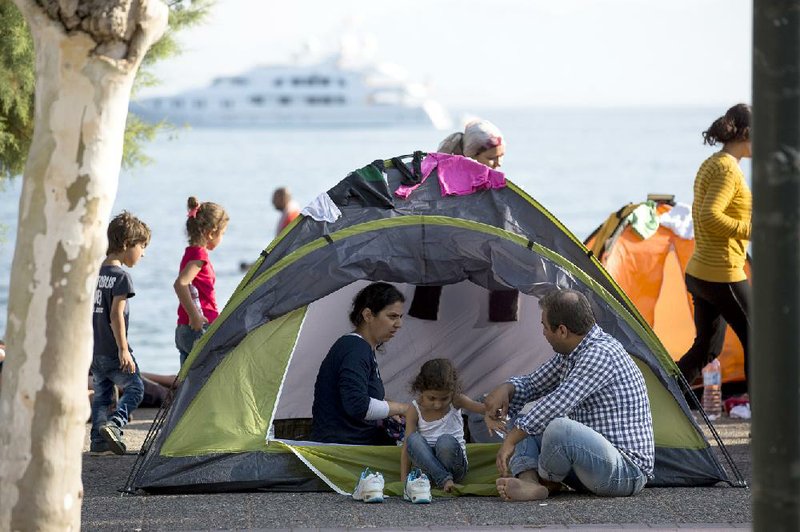KOS, Greece -- A giant passenger ferry reached the Greek holiday island of Kos on Friday to provide temporary accommodation for crowds of Syrian refugees sleeping rough after crossing clandestinely from Turkey in flimsy boats.
Also Friday, the International Organization for Migration said the number of asylum-seekers and other foreigners who have crossed the Mediterranean to Europe this year will pass the quarter-million mark by the end of the month -- more than half of them arriving in Greece.
The Eleftherios Venizelos ferry, which can hold up to 2,500 people, will function starting today as a screening center where Syrians can stay as they wait for temporary travel documents to leave the island and continue their journeys to other parts of Europe.
It will replace an old stadium criticized for its lack of basic amenities, where Greek authorities working intensively have screened and issued documents to about 7,000 Syrians since Monday.
Maj. Gen. Zacharoula Tsirigoti, head of the Greek police's aliens and border protection branch, said all the Syrians who had arrived on Kos by late Thursday have now been screened. She said the ferry will stay on for about two weeks to cater to new arrivals, whose numbers are expected to taper off as weather conditions deteriorate in the autumn.
Late Friday, about 1,900 Syrians, papers clasped in their hands, lined up patiently in a fenced-off part of Kos harbor to get on an Athens-bound ferry. Another 2,000 Syrians left Kos on Wednesday and Thursday, considerably reducing the overall number of people trapped on the island.
"I feel so good," said Omar Mohammad as he entered a checkpoint where harbor police checked documents and ferry tickets. "Wish me luck."
The 25-year-old English-literature graduate from Aleppo arrived on a beach on Kos on Wednesday in his third attempt to reach the island. Two previous ones were thwarted by Turkish police.
Just on the other side of the quay, dozens of rubber boats that had been used by refugees and confiscated by the coast guard bobbed up and down, tied up alongside a number of seized wooden yachts.
Many still contained the detritus of the voyage -- orange or red life vests for adults and tiny inflatable ones with cartoon characters for babies.
At least two rubber boats carrying men, women and children from Syria safely made the 2.5-mile crossing from Turkey early Friday. One landed on a swimming beach in the main town on Kos, where bathers watched as about 40 people in life vests came to shore among the umbrellas and air mattresses.
The Greek coast guard said it rescued nearly 600 refugees and other foreigners at sea from Thursday morning to Friday morning, in 21 separate incidents off Kos and the islands of Rhodes, Chios, Samothraki and Lesbos -- where most arrivals are recorded.
The Geneva-based International Organization for Migration said Friday that Greece has reported 134,988 arrivals from Turkey this year and that Italy recorded 93,540 newcomers up to the end of July. Adding in arrivals in Spain and Malta, the group said 237,000 people have made the crossing in 2015. It is forecasting that the total will top 250,000 by the end of August.
Over the whole of last year, 219,000 made the risky crossing to Europe.
The organization estimated that at least 2,300 people have died trying to make the crossing this year.
Meanwhile in Austria, Amnesty International said more than 1,000 people, including unaccompanied children, were camping in the open at Austria's main migrant collection center.
The rights watchdog described inadequate conditions in the number of beds, health care and other services, particularly for unaccompanied children, at the Traiskirchen center south of Vienna.
Members of the Amnesty team that visited the center Aug. 6 spoke of migrants seeking out shady areas of the center's grounds to escape from relentless heat, and of showers without curtains shared by both sexes. They said four doctors and three psychologists, working only a few hours a day, are responsible for the care of the more than 4,000 people at Traiskirchen.
The report said "access to adequate sanitary facilities was limited and the food supply was considered problematic.
"Health care was inadequate, asylum-seekers often had to accept long waiting periods up to days, meaning that serious medical problems could occur."
Amnesty noted "inhumane conditions ... for many asylum-seekers." It said that each of the 30 foreigners interviewed by the Amnesty team had "neither clear information about the status of their situation nor what would happen next," leading to insecurity and fear.
In a statement, the Interior Ministry acknowledged a "precarious situation" at the center, describing it as an "extraordinary situation" resulting from a surge of foreigners seeking asylum.
The statement noted that the federal government is working on a law that would allow refugees and other foreigners to be housed on or in property owned by the government.
Information for this article was contributed by Dalton Bennett, Geir Moulson, George Jahn and Philipp Jenne of The Associated Press.
A Section on 08/15/2015

